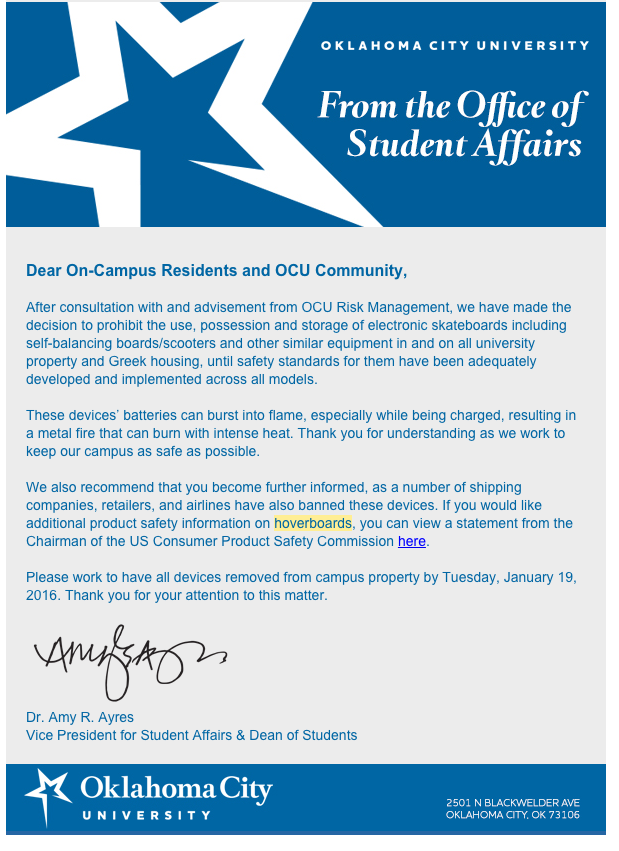
Photo Illustration: Markeisha Johnson, criminal justice senior, rides on her board outside of Tom and Brenda McDaniel University Center. The devices are banned from campus due to fire hazards.
At least one student wasn’t sure what to do with her hoverboard after a decision was made to ban the electric skateboards from campus.
Markeisha Johnson, criminal justice senior, is one of the few students on campus who rode a hoverboard.
“I was so excited to get it and all my friends love to ride it,” Johnson said. “Now I have to figure out what to do with it. I’m really sad.”
Johnson said she got the hoverboard in September. She has ridden the board every day since.
“I like it because after basketball practice, when I’ve been running the court, I can just hop on and don’t have to actually walk anywhere,” she said. “People would smile at me as I rode by, or sometimes they would stop me and say ‘oh that’s so cool, how do you ride it?’”
Johnson said she is keeping the board at a friend’s house off campus until she can figure out a way to get it home. She also plans on selling another board she has.
“I have already had some offers on one of the boards,” Johnson said. “But they don’t have the money now, so I am just keeping it there until I can figure it out.”
Johnson also said she contacted PowerBoard, the company that makes her boards, to see if there are safety concerns.
 Officials made the decision this month to prohibit the use, possession and storage of electric skateboards in and on all university property and in Greek housing. The policy will stay in effect until safety standards are developed and implemented across all models, wrote Amy Ayres, vice president for student affairs, in a Jan. 11 email sent to the campus community.
Officials made the decision this month to prohibit the use, possession and storage of electric skateboards in and on all university property and in Greek housing. The policy will stay in effect until safety standards are developed and implemented across all models, wrote Amy Ayres, vice president for student affairs, in a Jan. 11 email sent to the campus community.
“There is a significant fire safety hazard with hoverboards, primarily because there hasn’t been standardized requirements for the devices nationally,” Ayres said.
The boards are known to catch fire, either while charging or shortly after. This is because of the lithium-ion batteries in most models. The quality of the batteries used to power the boards can vary. Cheaper components make them more susceptible to fire, according to National Public Radio’s website, npr.org. The cheaper components in the batteries can cause the flammable electrolyte found in the batteries to ignite.
“Because there isn’t any safety standard for them, it is easier to ban the boards from campus than risk having a residence hall or any other building catch fire,” Ayres said.
The bans and partial bans started in December and have since grown to more than 30 schools, according to USA Today.
Several universities in Oklahoma, including the University of Oklahoma in Norman and Oklahoma State University in Stillwater, also banned the boards on their campuses.
Students were given until Jan. 19 to remove the devices from OCU’s campus. If one is found, the device will be confiscated and given to the police department. The student then would work with the police to remove the item from campus.
“The student would also follow the same conduct process just as if any other prohibited item is found,” Ayres said. “We can’t predict what the sanction might be, but it is dependent of their knowledge and how they worked with us to remove the item. Ultimately, it would be just like any other situation where a student was in violation of policy.”
Sanctions include probation, fines and university housing expulsion.
Students who are unsure if their device is affected by this policy can contact Lee Brown, university risk manager, by email at lebrown@okcu.edu for more information.
Click here to see what the editors think about the ban on hoverboards.


Leave a Reply